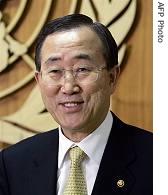2006年VOA标准英语-South Korea's Career Diplomat Set to Be Next UN(在线收听)
By Peter Heinlein
New York
03 October 2006
 Ban Ki-Moon |
||
-----
Sixty two-year-old Ban Ki-Moon is the quintessential career diplomat. He joined South Korea's foreign service in 1970, after graduating from Seoul's prestigious National University and earning a Masters degree from the Kennedy School of Government at Harvard.
He rose through the foreign ministry ranks, serving several stints in and around the United Nations during his 36-year career. Before taking the ministry's top job in January 2004, he served as chief aide to the president of the U.N. General Assembly.
Ban announced his candidacy for the secretary-general's job last February. Diplomats say he ran a smooth and efficient campaign, portraying himself as a quiet but effective administrator. In a speech to the U.N. General Assembly last month, he gave a preview of his vision for the world body.
"The United Nations was created first and foremost to forestall another world war. Not only has it achieved this cardinal goal despite four decades of Cold War, but it has also offered states multiple means of resolving their differences short of war," said Ban. "However, we cannot be sanguine about future trends. If the U.N.'s primary task in the 20th century was to curb interstate conflict, its core mandate in the new century must be to strengthen states and to preserve the interstate system in the face of new challenges."
Ban's friends and associates say his soft-spoken style is sometimes mistaken for a lack of charisma. But they say he can be a commanding presence. Jong sik Kong is the New York correspondent for South Korea's Dong-a Ilbo (East Asia) daily newspaper. He says the low-key appearance was part of Ban's campaign strategy.
"That was his strategy, including many South Korean diplomats, including Mr. Ban Ki-Moon himself kept emphasizing that," noted Jong. "They were keeping low key. I asked why they chose that strategy, their answer was like this, 'If they analyze the voting process, many candidates who are more high-profile usually fail, so that's why they chose the track of 'low key'".
Other veteran U.N. watchers say Ban is likely to focus more on managing the world body's vast bureaucracy than his predecessor, Kofi Annan. U.S. officials have made clear they want the next secretary-general to be more of an administrator. Suzanne Di Maggio, vice-president of the U.N. Association of the United States, says Ban campaigned on a "better management' platform.
"I think his intention is to make it a little different. He has stated publicly that he would like to appoint a deputy secretary-general who has the mandate and the authority to run day-to-day operations of the organization," she said. "So by virtue of that fact, it would be quite a different organization. "
U.S. diplomats hailed Ban's impending selection. Washington's U.N. Ambassador John Bolton noted that he had worked with the Korean diplomat a decade ago on the plan that eventually led to U.N. membership for both North and South Korea.
Critics have suggested that Ban's closeness to Washington might be seen as a handicap at the United Nations, given the world body's rocky relationship with Washington. The U.N. Association's Suzanne Di Maggio says Ban's relationship with Washington can be both a blessing and a curse.
"Certainly I think when he tries to call Washington, whether it's Secretary Rice or someone else, they will definitely pick up the phone," continued Di Maggio. "On the other hand, there are number of issues that are priorities on U.N agenda, that it may work to his disadvantage to be closely allied to the United States, I'm thinking of issues such as Iran nuclear program. In a case like that, it would be a disadvantage for someone like Mr. Ban."
In a recent interview, Ban himself rejected suggestions that his past association with America would hurt him. He told reporters, "that's an asset, not a liability".